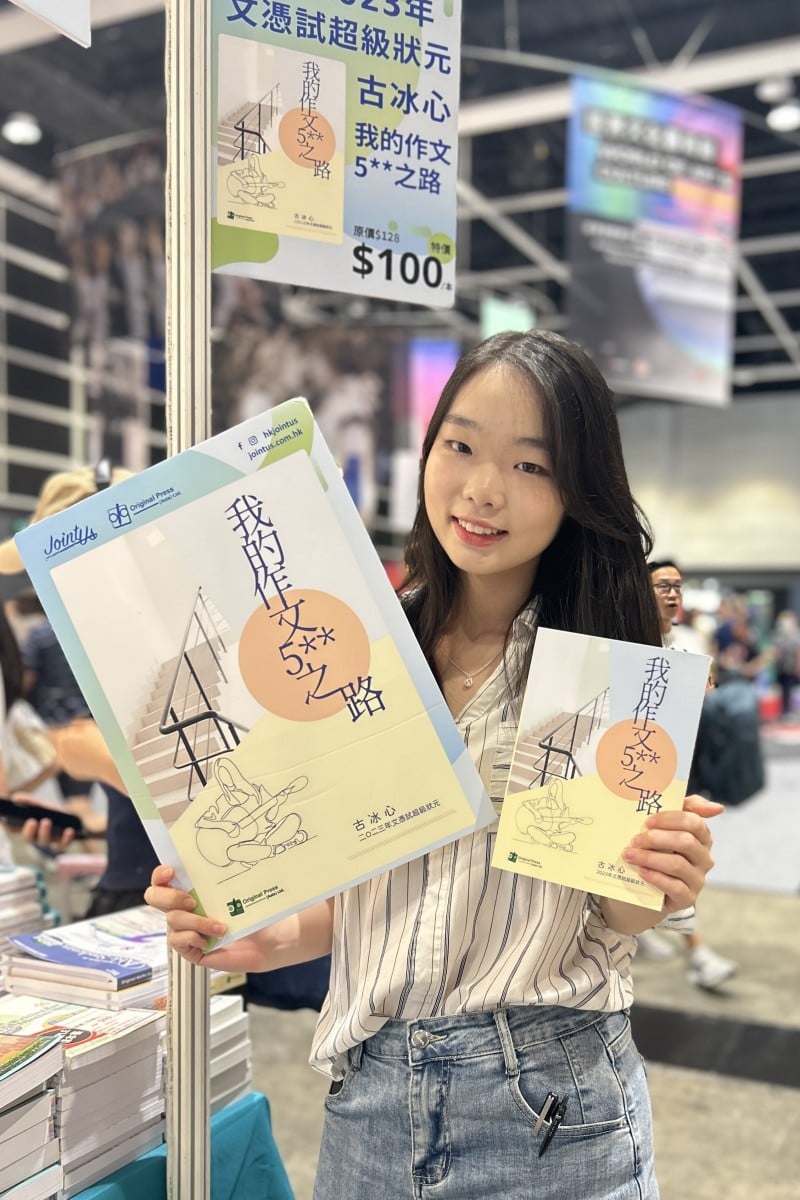
- Icy Ku, now a medical student at the University of Hong Kong, hopes to help other exam candidates with her book ‘My Road to Scoring 5** in Writing’
- Every week, Talking Points gives you a worksheet to practise your reading comprehension with exercises about the story we’ve written

 Icy Ku poses with her new book of study tips for the Chinese paper on the DSE exam. Photo: Handout
Icy Ku poses with her new book of study tips for the Chinese paper on the DSE exam. Photo: HandoutAs Form Six students in Hong Kong buckle down and begin preparing for their university entrance exams in April, many are dreading the Chinese paper, which is notoriously difficult. But a top-scorer from 2023, Icy Ku Ping-sum, hopes to give them a bit of inspiration and guidance with her new book, My Road to Scoring 5** in Writing.
“As I spent a lot of time exploring the ways and structure to improve essay writing during Form Six, I hope I can share my methods with other students so they don’t need to spend a lot of time doing the same thing,” Ku said.
The 19-year-old received top marks in eight subjects of the Diploma of Secondary Education (DSE) exams last year and is now a medical student at the University of Hong Kong.
Published in July and exhibited at the Hong Kong Book Fair, Ku’s book features 28 of her Chinese essays from Form One to Form Six, including annotations for essay planning tips and the use of literary elements.
Don’t fear the Chinese paper
When the publishing company first approached her about the book, Ku knew she wanted to focus on the Chinese subject, dubbed the “paper of death”, because she felt her tips would be useful for DSE candidates.
It took months for Ku and the editorial team to compile and edit her writing from secondary school.
“Everything went on at the same time to bring this book to life: the annotations, the design, editing, the printing and the marketing all came together in parallel,” she noted.
Ku added that she spent time refining her essays before sending them to publication: “I had a high standard for myself since it was my first book, so I wanted to make sure the content was well written.”
Trial and Error YouTubers discuss Once Upon a Time in HKDSE documentary on city’s exam culture
The author also had to balance the publishing process with her studies.
“People expect that it is easy to breeze through [medical school] exams as a top scorer, but in reality, that is not the case,” she shared.
“University exams are much more stressful than the DSE ... You have time to prepare for the DSE, but in medical school, you must learn and revise at the same time.”
In the future, Ku said she might publish her work on other DSE exam subjects, and she hoped to dedicate more time to writing music.
Tips for DSE candidates
The teen’s favourite essay in the book is “秘密” (Secret), which discusses how students hide the pressures they face, including mental health issues like depression.
“This is relatable for DSE students. We tend to hide our stress so we don’t affect each other with negative feelings while preparing for the exam,” the author explained.
Ku hoped to encourage students to share their feelings with people they trust so they can receive the mental support they need.
In addition to memorising passages and studying the works of authors featured in past papers, Ku recommended examining ideas through a unique lens when writing practice essays.
“For example, seeing a topic through its positive and negative spectrum, or through how ... it can cause an impact,” she noted.
It is also important to rest and relax, as it can help you avoid burnout. Taking breaks also improves students’ ability to recall information during exams.
In addition, it doesn’t hurt to give yourself some positive encouragement: “Telling yourself you are doing well can also be helpful,” Ku said.
When it comes to starting university, Ku advised incoming students to “consider how you are scheduling your studies.”
“Don’t expect there [to be] a lot of time to revise at the end of the semester ... try not to pack everything at the end,” she said, adding that students should also explore their hobbies and passions while they still have more time in their first year.
Whether Ku is sharing study tips, singing for her audience on Instagram or focusing on her career, she will surely be giving it her all.
To test your understanding of this story, download our printable worksheet or answer the questions in the quiz below.
